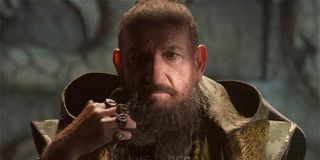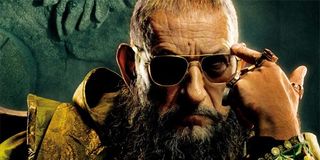You'll Never See Him Coming: Sir Ben Kingsley Talks Playing The Mandarin In Iron Man 3

In Shane Black’s Iron Man 3, The Mandarin is a dangerous enigma. He shows his power through destruction and his leadership through numbers. He speaks in a stern, clear voice and stares at you from a distance on the other side of a monitor. He is completely immersed in his own philosophy. For his performance, Sir Ben Kingsley dove head first into the character and crafted what is certainly one of the most memorable villains the genre has ever seen.
Last week I had the pleasure of sitting down with the Oscar winner one-on-one to talk about his villainous turn in the brand new Iron Man film. Check out our conversation below, in which Kingsley discusses not only his inspirations for his performance as The Mandarin, but the effect of having a character who lives in a bubble, and the value of holding on to a secret.
You’re not new to doing genre films, and this is even a big year for you having both Iron Man 3 and Ender’s Game. When you are looking at scripts, you’re looking at projects to do, is there a method to your script selection? How does that work for you?
Well, yeah. It’s a method, I think, that was laid down by, the great William Shakespeare, because I was very fortunate to like, Kenneth Branagh, spend a big, many years as a classical actor, working on Shakespeare and I find that his writing, which is probably why it’s survived, more than survived, it’s actually grown in stature over the years, is so beloved of audiences everywhere I go. I was in Moscow recently. Everywhere you go there is a major Shakespearean production going on and to make a long story short working on those plays, you see a writer who has an amazing grasp of genuine patterns of human behavior, totally genuine. They’re not a carbon copy of a carbon copy of something else, you know. They’re original and pure. So, when I’m reading a script, if I can’t see that pattern of human behavior. If I can’t see a genuine human map, I’m afraid I can’t breathe life into it. It just won’t work.
So, what was, kind of, your path getting to this project? Was it something they approached you about?
Shane Black wrote to me, sent me a lovely letter, telling me that he saw Sexy Beast a while ago and that he was in, I think it must have been the Toronto Film Festival, he was in the audience for the Q&A. He said he’ll never forget it, it was great... He was very generous and after the letter he invited me to join Iron Man 3. I then met Kevin Feige, he talked me through the amazing arch of the character. I then got the script. You know, it was quite simple. It wasn’t a very complicated entry into it and then once I arrived there, their welcoming was very generous and very kind and exciting and businesslike. I just really loved working with that team, because Robert [Downey Jr.] too is totally committed and Gwyneth [Paltrow] and Don [Cheadle] to the same pattern of human behavior, which you do see in these movies.
Where did you take inspiration from for your performance?
CINEMABLEND NEWSLETTER
Your Daily Blend of Entertainment News
I think that, from the script, they were strong...Tony Stark referring to me as a preacher, my own character referring to lessons, and my own character also saying that he prefers to call himself a teacher. All those clues allowed me to explore a voice that was presidential, measured, unhysterical, and completely rooted in its own sense of rightness and righteousness. When you are faced with somebody with a completely bizarre set of values and they are addressing you with them with such earnestness and belief in them, it’s very disconcerting. You can’t find a crack to get in and say, “You’re talking bullshit,” because they just won’t let you in and particularly with his device, where he’s not in the room with you. He’s there on the screen and he will barge into a whole TV network and suddenly there’s those weird stripes and the grainy documentary footage and then he’s there. So, you can’t, in a sense, you can’t interrupt and answer back, but at the same time, there’s something in his convictions, which I had to bring to the screen, which is uninterruptable. I was looking for that.

And an interesting aspect to this character is that you never see The Mandarin directly communicating with another character, it’s all through a camera and a monitor. How does that affect your approach?
Certain characters, you realize live in a bubble and the thrill is, “How do I keep this bubble hermetically sealed? How is this bubble, how cannot it be punctured,” and I’m fascinated by documentary footage and historical footage and I didn’t necessarily dive into them for this role, but I’m always watching them. I’m always looking for certain gestures and mannerisms and right back into speeches made in the early ‘30s, you see the man who is addressing this crowd in Munich or Berlin or wherever it took place, is totally convinced in his rightness, totally convinced of his place in destiny and that is a bubble that is unpierceable and he is, although he is, in the classic case, he so much says that he is a man of the people, completely removed. “I am here on the platform. Here’s my microphone. You’re down there.”
Marvel does have this thing about secrecy, and when you first came aboard with this project, they didn’t tell anyone that you were The Mandarin. They kept that kind of secret, and have worked hard to keep everything hidden until the big screen debut. I’m just curious about your opinion of that philosophy. How do you feel about that and how it’s affected you these past few months working with Marvel?
I remember working on a great production with The Royal Shakespeare Company and the director, it was Peter Brook, who is a great, great, great theater director, said, “And remember, when you are telling the story, what you should say to yourselves and enjoy is, we have secrets,” and I thought, that’s the most thrilling thing I’ve ever heard in the rehearsal room and I still thrill to the idea of having a secret that you eventually share with the audience. Yeah, I love it.
You mentioned that Shane Black approached you about this, but how familiar were you with his work going into the project?
With Shane Black himself, I wasn’t very well acquainted, I’m afraid.
Well, he directed his first film back in 2005, but before that, he was a writer for a long time. As an actor, did you see his particular background come out while he was working as a director?
Well, it possibly could, but I mean, his great gift to us as actors on the set was to give us a wonderful arena in which to work, beautiful, and once we’re in that arena, he has, in his manner, a way of saying to the actor, “It is your role. I’m now letting go. I’ve given it to you and I’m going to film you.” It’s a very brave and confident, inspiring process and a very generous one. There are lesser directors and writer/directors who you feel are auditioning you all of the time and they’re sort of leaning back and you never quite please them. They think that’s stimulating and gets good work out of you. It doesn’t.
It’s just a high pressure situation.
Yeah, it’s inhibiting, but what is not inhibiting and what allows the actor to take leaps of daring, is the director who says, “It’s yours.”

Eric Eisenberg is the Assistant Managing Editor at CinemaBlend. After graduating Boston University and earning a bachelor’s degree in journalism, he took a part-time job as a staff writer for CinemaBlend, and after six months was offered the opportunity to move to Los Angeles and take on a newly created West Coast Editor position. Over a decade later, he's continuing to advance his interests and expertise. In addition to conducting filmmaker interviews and contributing to the news and feature content of the site, Eric also oversees the Movie Reviews section, writes the the weekend box office report (published Sundays), and is the site's resident Stephen King expert. He has two King-related columns.
Most Popular




